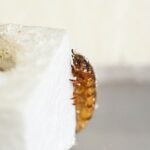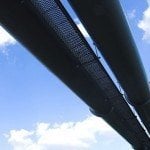
Healthcare workers make up the largest part of frontline workers in the battle against Covid-19. In the past year, many efforts have been made to combat the virus in different ways, with researchers creating omniphobic coatings, coatings that ‘deactivate the virus within an hour’, and even nanostructures that can kill specific viruses. Most recently, Liverpool researchers have been granted 615,000 GBP by U.K. Research and Innovation, a non-departmental public body sponsored by the Department for Business, Energy and Industrial Strategy. Their aim is to create a new antiviral PPE coating in order to protect those working in the healthcare industry from Covid-19.
 The university’s School of Engineering has aims to develop a coating that will be easy to apply to PPE (such as face visors and gloves) that is not only antiviral, but will have antifouling properties as well. The project is being led by Dr. Raechelle D’Sa and supported by Dr. Jenny Hanson.
The university’s School of Engineering has aims to develop a coating that will be easy to apply to PPE (such as face visors and gloves) that is not only antiviral, but will have antifouling properties as well. The project is being led by Dr. Raechelle D’Sa and supported by Dr. Jenny Hanson.
PPE plays a vital role in protecting healthcare workers as Covid-19 is transmitted via respiratory droplets (in coughs, sneezes, speaking) which can also survive on surfaces. Whilst PPE protects the workers caring for sick patients, there remains high amounts of viral load on the surfaces of it. As such, the process of taking PPE off presents an increased risk of transmission.
Disposing PPE also provides further risks of transmission, while single-use PPE has a detrimental effect on the environment and is therefore unviable.

Dr. D’Sa, who is an expert in antimicrobial materials design and therapeutics, said, “This project will use our expertise to produce an innovative new antiviral and antifouling coating which can be used on PPE to protect staff working in healthcare settings … This is a potential low-cost technology solution, that once proven can be taken forward in a relatively short timescale to provide additional protection from Covid-19 to healthcare workers.”
 To better understand how to minimize Covid-19’s viral transmission, the project will be investigating how long the virus survives on various PPE surfaces amidst a range of conditions. The desired engineered design of the coating will come as a result of these tests and environmentally conscious considerations.
To better understand how to minimize Covid-19’s viral transmission, the project will be investigating how long the virus survives on various PPE surfaces amidst a range of conditions. The desired engineered design of the coating will come as a result of these tests and environmentally conscious considerations.
Not the first of its kind of research, other universities and labs have also been pouring funding into methods of either deactivating, killing, or preventing the load of the virus onto surfaces, some onto specific surfaces (such as metal) and others that will be able to be applied to any surface and will help curb the spread of the virus in places like public transportation.
The project is funded by the UKRI COVID19 Rapid Response Call that supports research and innovation that address problems related to COVID-19.
The project involves co-investigators from the Liverpool School of Tropical Medicine, Liverpool University Hospitals NHS Trust, and the University of Toronto in Canada.
Source:
[1] Source: “Antiviral coating for PPE to protect healthcare workers”, The Engineer, (https://www.theengineer.co.uk/antiviral-coating-ppe-liverpool-university/).
[2] Source: “Researchers get funding for antiviral coating”, Paint Square, (https://www.paintsquare.com/news/?fuseaction=view&id=23084).
[3] Source: “Researchers to develop anti-Covid-19 coating for PPE”, University of Liverpool News, (https://news.liverpool.ac.uk/2020/11/02/researchers-to-develop-anti-covid-19-coating-for-ppe/#:~:text=Researchers%20at%20the%20University%20of,healthcare%20workers%20from%20Covid%2D19.).































